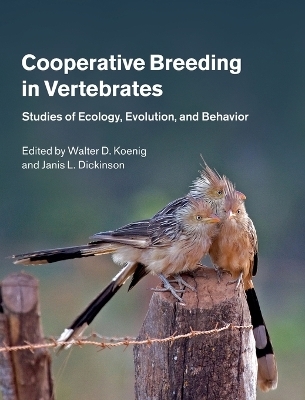
Cooperative Breeding in Vertebrates
Cambridge University Press (Verlag)
978-1-107-04343-5 (ISBN)
Cooperative breeders are species in which individuals beyond a pair assist in the production of young in a single brood or litter. Although relatively rare, cooperative breeding is widespread taxonomically and continues to pose challenges to our understanding of the evolution of cooperation and altruistic behavior. Bringing together long-term studies of cooperatively breeding birds, mammals, and fish, this volume provides a synthesis of current studies in the field. The chapters are organised by individual studies of particular species or (in the case of mole-rats) two closely related cooperatively breeding species. Each focuses not only on describing behavior and ecology but also on testing evolutionary hypotheses for the form and function of the diverse and extraordinary cooperative breeding lifestyles that have been discovered. This unique and comprehensive text will be of interest to graduate students and researchers of behavioral ecology and the evolution of cooperation.
Walter D. Koenig is Senior Scientist at the Lab of Ornithology and the Department of Neurobiology and Behavior at Cornell University, New York. He has studied cooperative breeding in acorn woodpeckers for over forty years. He is co-editor of Cooperative Breeding in Birds: Long-Term Studies of Ecology and Behavior (Cambridge, 1990) and Ecology and Evolution of Cooperative Breeding in Birds (Cambridge, 2004), and has published widely, primarily in the fields of population and behavioral ecology. Janis L. Dickinson is Arthur A. Allen Director of Citizen Science at the Cornell Lab of Ornithology and Professor in the Department of Natural Resources at Cornell University, New York. Her work has primarily been in the fields of sexual selection and social behavior in insects and birds; she has studied the behavioral ecology of western bluebirds for over twenty-five years and is also co-editor of Ecology and Evolution of Cooperative Breeding in Birds (Cambridge, 2004). Her current interests include understanding how socially networked web environments can be designed to support collaborative conservation actions.
List of contributors; Introduction Janis L. Dickinson and Walter D. Koenig; 1. Siberian jays: delayed dispersal in the absence of cooperative breeding Jan Ekman and Michael Griesser; 2. Western bluebirds: lessons from a marginal cooperative breeder Janis L. Dickinson, Çağlar Akçay, Elise D. Ferree and Caitlin A. Stern; 3. Long-tailed tits: ecological causes and fitness consequences of redirected helping Ben J. Hatchwell; 4. Red-cockaded woodpeckers: alternative pathways to breeding success Jeffrey R. Walters and Victoria Garcia; 5. Florida scrub-jays: advantages of large territories and group-defense in a fire-maintained habitat John W. Fitzpatrick and Reed Bowman; 6. Carrion crows: family living and helping in a flexible social system Vittorio Baglione and Daniela Canestrari; 7. Southern pied babblers: the dynamics of conflict and cooperation in a group-living society Amanda R. Ridley; 8. Superb fairy-wrens: making the worst of a good job Andrew Cockburn, Lyanne Brouwer, Nicolas Margraf, Helen L. Osmond and Martijn van de Pol; 9. Chestnut-crowned babblers: dealing with climatic adversity and uncertainty in the Australian arid zone Andrew F. Russell; 10. Bell miners: kin-selected helping decisions Jonathan Wright and Paul G. McDonald; 11. Superb starlings: cooperation and conflict in an unpredictable environment Dustin R. Rubenstein; 12. Seychelles warblers: complexities of the helping paradox Jan Komdeur, Terry Burke, Hannah Dugdale and David S. Richardson; 13. Acorn woodpeckers: helping at the nest, polygynandry, and dependence on a variable acorn crop Walter D. Koenig, Eric L. Walters and Joseph Haydock; 14. Taiwan yuhinas: unrelated joint-nesters cooperate in unfavorable environments Sheng-Feng Shen, Hsiao-Wei Yuan and Mark Liu; 15. Guira cuckoos: cooperation, infanticide, and female reproductive investment in a joint-nesting species Regina H. Macedo; 16. Cichlid fishes: a model for the integrative study of social behavior Michael Taborsky; 17. Meerkats: cooperative breeding in the Kalahari Tim Clutton-Brock and Marta Manser; 18. Banded mongooses: demography, life history, and social behavior Michael A. Cant, Hazel J. Nichols, Faye J. Thompson and Emma Vitikainen; 19. Damaraland and naked mole-rats: convergence of social evolution Chris G. Faulkes and Nigel C. Bennett; 20. Synthesis: cooperative breeding in the twenty-first century Walter D. Koenig, Janis L. Dickinson and Stephen T. Emlen; Taxonomic index; Subject index.
| Erscheint lt. Verlag | 7.1.2016 |
|---|---|
| Zusatzinfo | 32 Tables, black and white; 12 Plates, color; 83 Halftones, unspecified; 83 Halftones, black and white; 98 Line drawings, black and white |
| Verlagsort | Cambridge |
| Sprache | englisch |
| Maße | 195 x 253 mm |
| Gewicht | 1010 g |
| Themenwelt | Naturwissenschaften ► Biologie ► Zoologie |
| ISBN-10 | 1-107-04343-3 / 1107043433 |
| ISBN-13 | 978-1-107-04343-5 / 9781107043435 |
| Zustand | Neuware |
| Haben Sie eine Frage zum Produkt? |
aus dem Bereich


